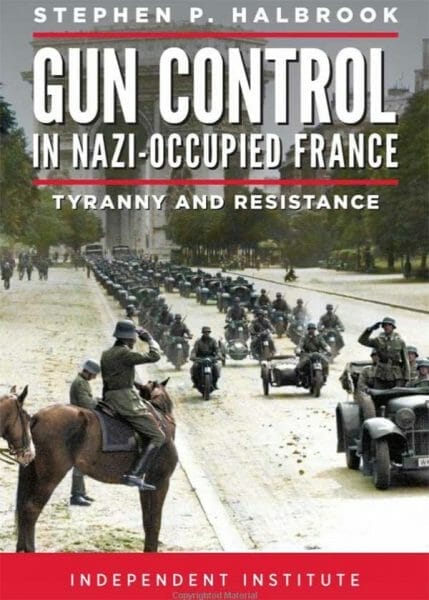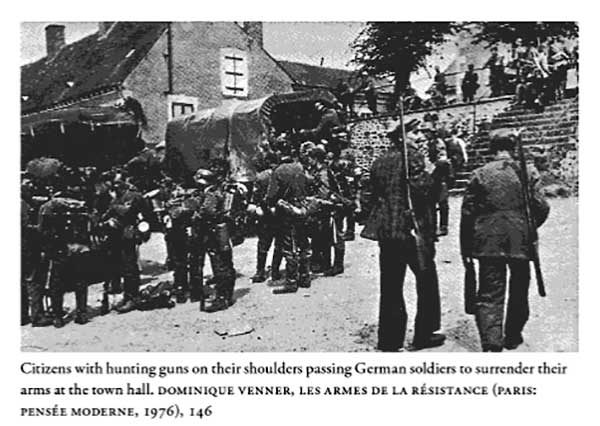
GUN CONTROL IN NAZI OCCUPIED FRANCE: TYRANNY & RESISTANCE-BOOK REVIEW
BY CHRIS KNOX
USA – -(AmmoLand.com)- No discussion of gun control goes for very long before someone mentions Nazis. Yet surprisingly little historical research has delved into what the Nazis actually did, both in prewar Germany and in the countries that fell before the invading Nazi armies.
With his recently-released Gun Control in Nazi-occupied France and its 2014 predecessor, Gun Control in the Third Reich. Dr. Stephen Halbrook has started mining a long-ignored vein in the history of World War II.
Gun Control in Nazi Occupied-France: Tyranny And Resistance
That historians have so carefully avoided the topic for so long is remarkable in itself. Dr. Halbrook avoids accusations, but he succeeds in gently raising the question of why the topic has been ignored. It just might be that academic backers of “common sense” restrictions on guns find it uncomfortable to see policies they favor being modeled by the archetype of totalitarian government.
Whatever the reason, the topic has gone virtually unstudied for the past seven decades. Halbrook's work is a good start on remedying that lack of scholarship.
Working from a trove of historical source documents in French and German, and from questionnaires he sent to veterans of the French Resistance, Dr. Halbrook has produced a detailed and meticulously researched picture of how the invading Nazis viewed arms in the hands of ordinary Frenchmen, and the steps they undertook to eradicate what they considered a menace to the success of their occupation.
Despite academia choosing to avoid the topic, the Nazi policies made an impression on WWII GIs and on the folks back home. The idea of “gun control” was foreign to most American ground-pounders, but they saw and heard of the atrocities committed by the Nazis against ordinary people for the crime of keeping a gun handy – proving to those unsophisticated “grunts” just how badly those guns were needed. As the Nazi blitzkrieg rolled across the low countries into France, they followed the same procedure in each town they entered. Upon subduing a town, soldiers immediately put up posters in the local language ordering that all guns be turned in, usually including threats of execution. Where registration records were available, the Nazis referred to the records and paid visits to the addresses they found there.
It was these oft-repeated, but rarely verified stories that made an impression on the American GIs, and that led to gun registration being political poison through the postwar years. One such story, this one set not in France, but in Belgium, was related by a refugee-turned-soldier, to my late father, Neal Knox. For years Dad told the story of The Belgian Corporal, usually after dinner with friends when someone asked him how he got into the fight for the Second Amendment. Dad committed the story to print only once or twice, partly because he could not substantiate the tale, and because he did not want the story to become trite.
What is undeniable is the impact that the story had on Dad and on our family. What is now also undeniable is the outline of that story, where a registered gun that could not be found led to an entire family being machine-gunned in the town square, was repeated not only in Belgium, but in France, the Netherlands, and without any doubt, in Czechoslovakia, Poland, and elsewhere.
The French gun registration law was moved into place with the best of intentions, as all such laws are.
A global depression was in full swing in 1935, and crime was high – a handy excuse for disarming the populace. The real reason, however, was that revolution was in the air, and fights between armed extremists were all too common. The French government saw it prudent to register the guns in order to confiscate them if need be. The politician who pushed the French registration law was none other than Pierre Laval, who would later lead the Vichy puppet regime, and would eventually be shot as a collaborator. The German Wehrmacht would find those registration records quite handy as they moved in to administer their new puppet state.

Halbrook's book details the almost comical swings between orders to turn in guns or be shot followed by amnesties to turn in guns with no questions, followed again by death threats against those who failed to report those who had guns, followed by more amnesties. I say “almost comical” because the matter was serious business. Thousands lost their lives. Trees that served as stakes where condemned gun owners were tied up and shot fell over, cut down by the daily barrages of the firing squads. Yet the French people, especially those in rural areas, defied the orders hiding their own guns or passing them on to the Resistance.
The Nazis lack of success in making France a “gun-free zone” might provide a lesson for current politicians. A good portion of Frenchmen did not give up their guns in the face of firing squads. The low rates of compliance with registration laws in California, New York, and Connecticut really should not be all that surprising.
Stephen Halbrook's Gun Control in Nazi Occupied-France: Tyranny And Resistance is an important book, one that deserves a place on the bookshelf of anyone who holds the Second Amendment dear. The history of the Nazis and their gun control should not be buried in obscure footnotes. It should be readily available and studied for the important lessons that can be learned and applied today. Halbrook's books are a great start.